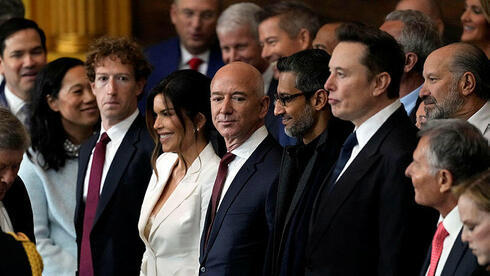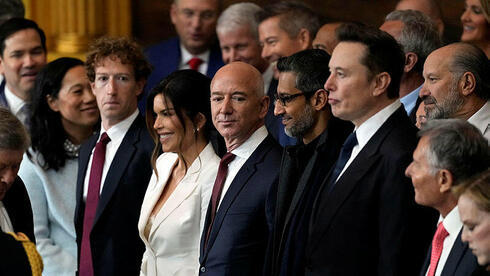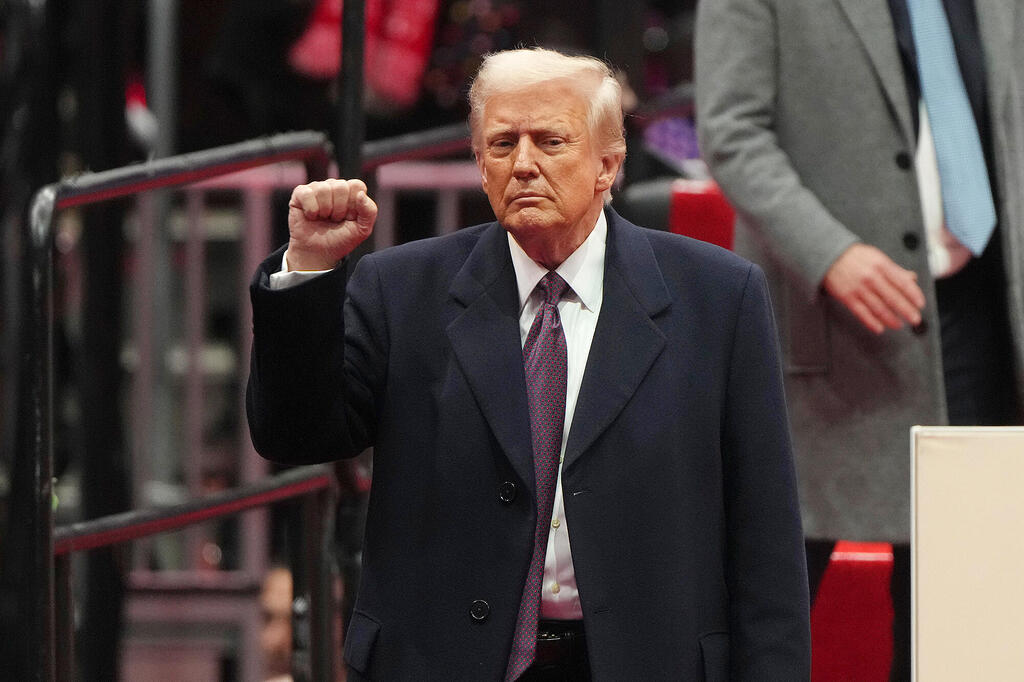
Can EU laws hold against Big Tech's power play?
European Commission faces a high-stakes battle to enforce digital and AI rules.
In recent weeks, tech giants have launched a lobbying campaign against the European Union's technology regulations in an attempt to dilute them and make implementation easier. The trigger for this effort is the stance taken by President Donald Trump's administration against the EU's strict regulation of American technology companies, as well as the companies’ hope of gaining support from the White House. The move is likely to lead to a clash between the U.S. and the EU, in what could be described as a regulatory war.
Over the past two years, the EU has enacted a series of legislative measures that have introduced new and comprehensive regulations in the technology sector. The Digital Services Act (DSA), which took effect in August 2023, imposes numerous restrictions and obligations on platform and search engine operators. These include a requirement to act against illegal activity upon receiving an appropriate order, publish an annual report on content removals and user appeals, prepare an annual systemic risk management report, and develop an emergency response mechanism for times of crisis.
2 View gallery


From right: Elon Musk, Sundar Pichai, Jeff Bezos (with his fiancee), Mark Zuckerberg
(Photo: AP Photo/Julia Demaree Nikhinson, Pool)
In March 2024, the Digital Markets Act (DMA) came into force, requiring technology companies to limit their use of personal data, reduce exclusivity in the products or services they offer to end users, allow the installation of third-party applications on their operating systems, and refrain from giving preferential treatment to their own products over those of competitors.
The EU’s AI Act will take effect in August 2025. This law broadly regulates artificial intelligence systems and, among other things, nearly bans the use of AI for manipulating human behavior or identifying individuals based on social ranking. It also imposes restrictions on AI applications in healthcare, education, employment, law enforcement, and justice, as well as on generative AI (GenAI) systems.
The most significant restrictions imposed by these new laws primarily impact large technology companies. Due to the structure of the global tech market, American firms bear most of the burden. For example, under the DSA, Meta must allow users to appeal decisions that reduce the visibility of their content, even if the content itself is not removed from Facebook or Instagram. Amazon is required to enable alerts about illegal products on its platform and disclose more information about sellers.
The DMA forced Apple to allow apps to be installed on iPhones through independent app stores or developer websites rather than solely via the App Store. Google was required to stop prioritizing its own services in search results over those of competitors—a practice that has already resulted in massive EU fines. According to the companies, the AI Act has created uncertainty, leading them to delay AI service rollouts in Europe. For instance, Apple has postponed the launch of its Apple Intelligence system for iPhones and iPads in the EU until at least April, and Meta has stated it will not introduce GenAI models in the region for now.
"America will not agree to tighter regulation"
Technology giants now have an ally in the White House, with whom they hope to ease EU regulations. Throughout his presidential campaign, Trump consistently criticized these regulations, arguing that they create an unfair competitive environment for American companies. Just three days after his inauguration, he said in a video speech at the World Economic Forum in Davos that EU fines against American firms amounted to “a form of taxation.” "They got $15 or $16 billion from Apple. They got billions from Google. They want billions from Facebook. These are American companies, and they shouldn't be doing this," he stated.
Vice President J.D. Vance reinforced the administration’s position last week in a speech in Paris: "We are troubled by reports that foreign governments are considering tightening regulation of American technology companies with international operations. America will not agree to this."
Since Trump’s victory in November, tech companies have been working to strengthen ties with his administration. They now hope that their improved relations and shared interest in reducing regulations on U.S. companies will prompt the White House to support their fight against the EU’s new rules.
According to a report in the Financial Times, tech giants are increasingly confident in their ability to challenge the new regulations and believe they will receive backing from the administration. Sources familiar with Meta’s strategy say the company has recently ramped up its opposition to the AI Act, aiming to weaken its implementation. Simultaneously, companies are working to limit enforcement of the Digital Markets Act, particularly to prevent massive fines. As part of their lobbying efforts, senior executives such as Google CEO Sundar Pichai, Apple CEO Tim Cook, and Amazon founder Jeff Bezos were prominently positioned at Trump’s inauguration.
The most immediate battle is over the EU’s AI Code of Conduct, expected in April, which will define how companies must comply with the AI Act. Meta has already stated it will not voluntarily adhere to the code. The company’s policy director, Joel Kaplan, said in Brussels this month that the code imposes “impracticable and technically impossible requirements” and warned that without a U.S.-EU partnership, China could win the AI race.
“Trying to stifle potential competition”
These lobbying efforts have already seen some success. Last week, the European Commission withdrew its proposal for an AI liability directive, which would have required companies to pay for damage caused by their AI systems. EU Vice-President Henna Virkkunen stated that the decision was aimed at encouraging AI investment and was not a response to U.S. tech lobbying. “Europe is fully committed to enforcing the rules, despite U.S. pressure,” she told the Financial Times. However, EU officials see this as a signal that the legislation and its enforcement could become bargaining chips in negotiations with Washington—potentially in exchange for U.S. commitments on trade tariffs or European security.
Another key battleground is the Digital Markets Act. The Commission has already launched investigations into Apple, Meta, and Google for violations of the law, which could result in fines of up to 10% of their global revenue. However, in January, the Financial Times reported that the Commission is reconsidering these investigations and may scale them back or even drop them—partly in response to Trump’s election victory. At the same time, tech firms are seeking clearer definitions of the law’s scope and additional guidelines that could weaken enforcement. "Because of the Trump effect, there is a threat of a diplomatic incident if sanctions are imposed on the largest U.S. companies," said a source within the EU Commission.
Giorgos Verdi, a policy fellow at the European Council on Foreign Relations, noted that the Commission’s potential decision to relax enforcement would be welcomed by EU leaders reluctant to confront the tech giants. However, he warned: "This would not only set a bad precedent for the EU’s regulatory approach but would also embolden the Trump administration and tech companies, who would see inaction as a sign of weakness."
Several European companies and industry associations urged the Commission in January not to cave to pressure from tech giants seeking to use the Trump administration to stifle competition. They emphasized the importance of enforcing the new regulations. Virkkunen herself stated that lobbying efforts would not lead to regulatory change. "The European Union is one of the biggest markets for tech giants," she said.
The firm stance advocated by Virkkunen aligns with the EU’s broader approach to technology regulation, which for more than a decade has focused on limiting the power of large tech companies while protecting domestic businesses and user rights. However, the EU has never faced an administration as determined as Trump’s to shield American companies from European oversight.
Now, with Trump aggressively opposing EU regulations and tech giants deepening their ties with him, the EU will face more pressure than ever to enforce its new laws.
If the Commission backs down, it risks losing any meaningful regulatory leverage over the tech giants, effectively allowing them to operate with minimal oversight in Europe. If it holds firm, it could trigger a significant confrontation with a president known for retaliatory economic and security measures.














